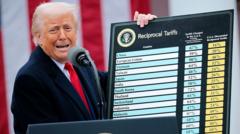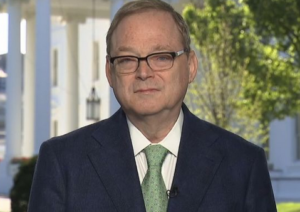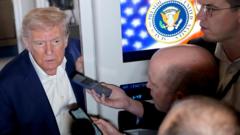In a major retaliation against the U.S. administration’s increased tariffs, China has announced a suspension on the export of certain rare earth minerals and magnets essential for various sectors, including automotive, semiconductors, and aerospace. This pause, which necessitates special export licenses for these materials, has raised concerns among industry leaders regarding potential shortages. The current framework for issuing these licenses remains underdeveloped, leading to fears of supply disruptions in international markets.
China Suspends Rare Earth Exports in Retaliation to U.S. Tariffs

China Suspends Rare Earth Exports in Retaliation to U.S. Tariffs
China's halt on crucial exports marks a significant development in the ongoing trade conflict with the U.S., impacting global industries reliant on rare minerals.
The backdrop to this escalation is President Trump’s intensifying trade battle with China, which has destabilized the outlook for global businesses. Both sides appear to be in a standoff, with China's President Xi Jinping avoiding direct communication with Trump amid rising tensions. Xi's recent diplomatic tour of Vietnam, Malaysia, and Cambodia is expected to include the signing of multiple agreements, demonstrating China’s strategy to strengthen regional partnerships while navigating the trade conflict.
Moreover, the U.S. is contemplating further tariffs on computer chips, adding to the uncertainty in international trade. American consumers are feeling the pressure as retailers deliberate on whether to increase prices or absorb the additional costs due to tariffs. The long-standing trade tensions echo similar patterns seen during past trade negotiations, such as Brexit.
As the trade war continues, Taiwanese exporters voice concerns over the unpredictable environment created by tariffs, hinting at a broader disruption in the global supply chain. U.S. Treasury Secretary Scott Bessent has attempted to moderate Trump's aggressive stance, yet uncertainty remains a persistent theme across impacted industries.
As the situation evolves, observing the implications on global markets and economies will be essential in understanding the broader consequences of the trade war.
Moreover, the U.S. is contemplating further tariffs on computer chips, adding to the uncertainty in international trade. American consumers are feeling the pressure as retailers deliberate on whether to increase prices or absorb the additional costs due to tariffs. The long-standing trade tensions echo similar patterns seen during past trade negotiations, such as Brexit.
As the trade war continues, Taiwanese exporters voice concerns over the unpredictable environment created by tariffs, hinting at a broader disruption in the global supply chain. U.S. Treasury Secretary Scott Bessent has attempted to moderate Trump's aggressive stance, yet uncertainty remains a persistent theme across impacted industries.
As the situation evolves, observing the implications on global markets and economies will be essential in understanding the broader consequences of the trade war.






















